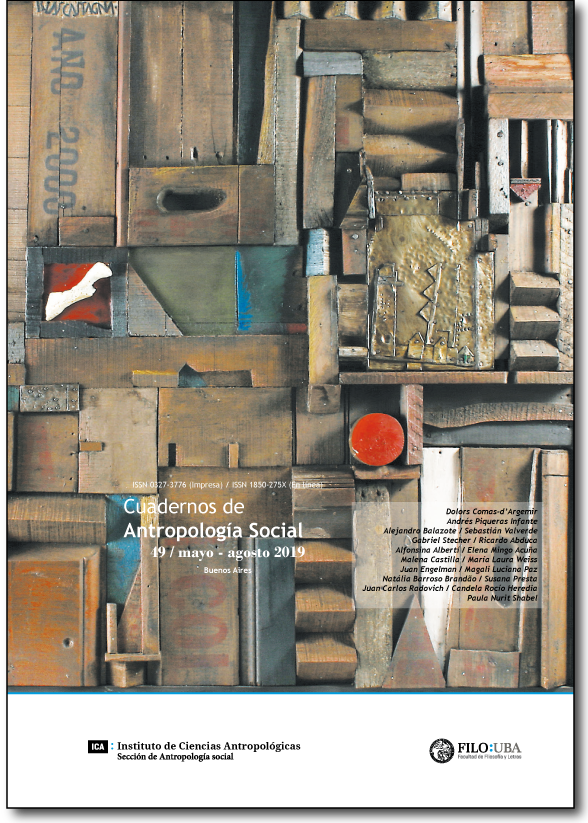Social care and rights. Moving towards the democratization of social care
Abstract
The article argues that care is of particular interest to economic anthropology, as it incorporates seemingly contradictory tendencies: to remain in the family sphere, outside of labor/capital relations and, on the other hand, to be in the process of commodification and to be constructed as a social and political question. Both tendencies are located in turn in the tension between the mechanisms of production and social reproduction. The article deals with the issue of care as a right and, therefore, as an issue of political scope. Starting from the observation that care falls disproportionately on women and families, it suggests the need for its equitable redistribution between family, state and community, and between women and men, in order to advance towards its democratization.Downloads
References
» Bhattacharya, T. (2013). Explaining gender violence in the neoliberal era. Internacional
Socialist Review, 91. Recuperado de https://isreview.org/issue/91/explaining-gender-violence-neoliberal-era
» Boris, E. y Parreñas, R. (Ed.) (2010). Intimate labors: Cultures, technologies and politics of
care. Standford: Stanford University Press.
» Carrasco, C., Borderías, C. y Torns, T. (Eds.) (2011). El trabajo de cuidados. Historia, teoría
y políticas. Madrid: La Catarata.
» Carsten, J. (2004). After kinship. Cambridge: Cambridge University Press.
» Comas d’Argemir, D. (1998). Antropología económica. Barcelona: Ariel.
» Comas d’Argemir, D. (2015). Los cuidados de larga duración y el cuarto pilar del Estado
del bienestar. Revista de Antropología Social, 24, 375-404. doi: 10.5209/rev_RASO.2015.
v24.50663
» Comas d’Argemir, D. (2016). Hombres cuidadores: barreras de género y modelos emergentes. Psicoperspectivas. Individuo y Sociedad, 15(3), 10-22. doi: 10527/PSICOPERSPECTIVAS-VOL15-ISSUE3-FULL-750
» Comas d’Argemir, D. (2017). El don y la reciprocidad tienen género: las bases morales de
los cuidados. Quaderns-e de l’Institut Català d’Antropologia, 22(2), 17-32. Recuperado de
http://www.antropologia.cat/files/2_ComasdArgemir.pdf
» Comas d’Argemir, D. y Roigè, X. (2018). Introduction. Between family and State. The new
faces of ageing in Europe. Ethnologie française, 171, 389-400. Recuperado de https://www.
cairn-int.info/article-E_ETHN_183_0389--between-family-and-state-thenew-faces.htm
» Comas d’Argemir, D. y Soronellas, M. (2019). Men as Carers in Long-Term Caring. Doing Gender and Doing Kinship. Journal of Family Issues, 40(3), 315-339. doi:
1177/0192513X18813185
» Constable, N. (2009). The commodification of intimacy: Marriage, sex, and reproductive labor. Annual Review of Anthropology, 38, 49-64. doi:10.1146/annurev.
anthro.37.081407.085133
» Coraggio, J.L. (1999). Política social y economía del trabajo. Alternativas a la política neoliberal para la ciudad. Madrid: Miño y Dávila.
» Daly, M. y Lewis, J. (2011). El concepto de ‘social care’ y el análisis de los Estados del
Bienestar contemporáneos. En C. Carrasco, C. Borderías y T. Torns (Eds.), El trabajo de
cuidados; historia, teoría y políticas (pp. 225-251). Madrid: La Catarata.
» Drotbohm, H. y Alber, E. (2015). Introduction. En E. Alber y H. Drotbhom (Eds.), Anthropological perspectives of care, work, kinship, and the life-course (pp. 1-19). Nueva York:
Palgrave MacMillan.
» Ehrenreich, B. y Hochschild, A.R. (Eds.) (2003). Global Woman. Nannies, Maids and Sex
Workers in the New Economy. Nueva York: Henry Holt and Co.
» Esquivel, V. (2011). La economía del cuidado en América Latina: poniendo a los cuidados en
el centro de la agenda. El Salvador: PNUD.
» Esquivel, V., Faur, E. y Jelín, E. (Coords.) (2012). Las lógicas del cuidado infantil. Entre
las familias, el Estado y el mercado. Buenos Aires: IDES-Unicef-Unpfa. Recuperado de
http://cddhh.ides.org.ar/files/2012/06/Las-l%C3%B3gicas-del-cuidado-infantil.-Entrelas-familias-el-Estado-y-el-mercado.1.pdf
» Ezquerra, S. y Mansilla, E. (2018). Economia de les cures i política municipal: cap a una
democratització de la cura a la ciutat de Barcelona. Barcelona: Ajuntament de Barcelona,
Universitat de Vic, La Ciutat Invisible Coop. Recuperado de http://ajuntament.barcelona.cat/tempsicures/sites/default/files/economia_i_politica_13.pdf
» Faur, E. (2014). El cuidado infantil en el siglo XXI. Mujeres malabaristas en una sociedad
desigual. Buenos Aires: Siglo XXI.
» Finch, J. y Groves, D. (Eds.) (1983). A labour of love: women, work and caring. Londres:
Routledge-Kegan.
» Fournier, M. (2016). La labor de las trabajadoras comunitarias de cuidado infantil en el
conurbano bonaerense. ¿Una forma de subsidio de “abajo hacia arriba”? Trabajo y Sociedad, 28: 83-108. Recuperado de https://www.redalyc.org/articulo.oa?id=387349334005
» Fraser, N. (2008). Escalas de justicia. Barcelona: Herder.
» Gilligan, C. (2013). La ética del cuidado. Barcelona: Fundació Víctor Grífols i Lucas.
» Godelier, M. (2017). Transitions et subordinations au capitalisme. París: Éditions de la Maison des sciences de l’homme.
» Harris, O. y Young, K. (1981). Engendered structures: some problems in the analysis of
reproduction. En J. S. Kahn y J. R. Llobera (Eds.), The Anthropology of Pre-capitalist Societies (pp. 107-147). Londres: MacMillan.
» Himmelweit, S. y Land, H. (2011). Reducing gender inequalities to create a sustainable
care system. Kurswechsel, 4: 49-63.
» Katz, C. (2001). Vagabond Capitalism and the Necessity of Social Reproduction. Antipode, 33(4), 709-728. doi: 10.1111/1467-8330.00207
» Mead, M. (1980). Cultura y compromiso. Estudio sobre la ruptura generacional. Barcelona:
Gedisa.
» Offenhenden, M. (2017). ‘Si hay que romperse una, se rompe’. El trabajo del hogar y la
reproducción social estratificada (tesis de doctorado). Universitat Rovira i Virgili, Tarragona, España. Recuperado de https://www.tdx.cat/bitstream/handle/10803/460763/TESI.
pdf?sequence=1
» Polanyi, K. (1989). La gran transformación. Crítica del liberalismo económico. Madrid: La
Piqueta.
» Presta, S. y Landaburu, L. (2014). Economía social y solidaria: paradojas de la “moneda social”. Idéias, 5(2), 141-159. Recuperado de https://periodicos.sbu.unicamp.br/ojs/
index.php/ideias/article/view/8649433
» Razavi, S. (2007). The Political and Social Economy of Care in a Development Context.
Conceptual Issues, Research Questions and Policy Options. Gender and Development
Programme, Paper numer 3. United Nations Institute for Social Development.
» Razavi, S. y Staab, S. (2010). Underpaid and overworked: A cross-national perspective on care workers. International Labour Review, 149(4), 407-422. doi: 10.1111/j.1564-
X.2010.00095.x
» Thelen, T. (2015). Care as social organization: Creating, maintaining and dissolving significant relations. Anthropological Theory, 15, 497-515. doi: 10.1177/1463499615600893
Tobío, C., Agulló, M. S., Gómez, M. V. y Martín, M.T. (2011). El cuidado de las personas.
Un reto para el siglo XXI. Barcelona: Fundació La Caixa. Recuperado de https://multimedia.caixabank.es/lacaixa/ondemand/obrasocial/pdf/estudiossociales/vol28_completo_es.pdf
» Wallerstein, I. (1988). El capitalismo histórico. Madrid: Siglo XXI.
» Wikander, U. (2016). De criada a empleada. Poder, sexo y división del trabajo (1789-1950).
Madrid: Siglo XXI.

Esta obra está bajo una Licencia Creative Commons Atribución 4.0 Internacional
Cuadernos de Antropología Social sostiene su compromiso con las políticas de Acceso Abierto a la información científica, al considerar que tanto las publicaciones científicas como las investigaciones financiadas con fondos públicos deben circular en Internet en forma libre, gratuita y sin restricciones.
Los contenidos y opiniones expresadas en los artículos publicados son de entera responsabilidad de sus autores.
Los autores/as que publiquen en esta revista aceptan las siguientes condiciones:
- Los autores/as conservan los derechos de autor y ceden a la revista el derecho de la primera publicación, bajo la licencia de atribución de Creative Commons, que permite a terceros utilizar lo publicado siempre que mencionen la autoría del trabajo y a la primera publicación en esta revista.
- Los autores/as pueden realizar otros acuerdos contractuales independientes y adicionales para la distribución no exclusiva de la versión del artículo publicado en esta revista (p. ej., incluirlo en un repositorio institucional o publicarlo en un libro) siempre que indiquen claramente que el trabajo se publicó por primera vez en esta revista.















